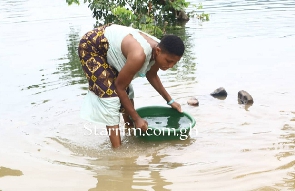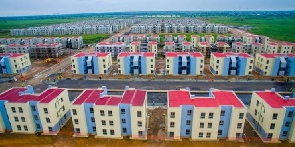A significant public health concern has emerged as the Schistosoma parasite, known to cause Schistosomiasis, commonly referred to as bilharzia, is likely to surge in Asuogyaman District in the Eastern region in the aftermath of the Akosombo Dam Spillage.
The disease is endemic in communities living along the Volta Lake in the district.
Over the years, the Ghana Health Service and the Volta River Authority have periodically administered praziquantel, a prescription medication for treating the disease among the populace.
Schistosomiasis is a disease caused by parasitic flatworms that can enter the skin when individuals come into contact with contaminated bodies of water.
The disease is notably associated with bladder cancer, and while there is no vaccine for it, there is a drug available for treatment.
Transmission occurs when larval forms of the parasite, released by freshwater snails, penetrate the skin during contact with infested water.
Further transmission can occur when people suffering from schistosomiasis contaminate freshwater sources with feces or urine containing parasite eggs, which then hatch in the water.
Prevalence situation in Asuogyaman district has raised significant concerns as the spillage of the Akosombo Hydroelectric Dam has caused severe floods in numerous communities downstream of the Volta River, potentially exacerbating the spread of the disease due to the increased pollution.
Member of Parliament for Asuogyaman, Thomas Ampem Nyarko, over the weekend while distributing relief items including rice, cooking oil, bottled water with support of the national chairman of NDC Johnson Asiedu Nketia, advised residents in flood-affected communities to refrain from drinking raw water from the river or swimming in it to protect themselves from infestation with the Schistosoma parasite and other waterborne infections.
Thomas Ampem Nyarko emphasized the importance of heeding this advice, citing the prior discovery of the Schistosoma parasite in the lake by the District Health Directorate.
“The District Health Directorate announced before the spillage of the Akosombo dam that they found Schistosoma parasite in the lake, so you don’t have to bath in the lake or drink raw water from it. The District Director of Health has told me she’s gone round communities along the lake to speak to the people to boil water they fetch from the lake very well and allow to cool down and filter before using”.
He stressed the need to boil water fetched from the lake thoroughly and allow it to cool down and filter it before use stating that the river has been seriously polluted due to the flooding, as it carried rubbish and human excreta, making the water unhealthy for consumption.
He assured residents of his commitment to quickly mechanize a borehole in the Kokonte Kpedzi Community to provide safe drinking water.
It’s important to note that according to estimates from the World Health Organization, a significant number of people required preventive treatment for schistosomiasis in 2021, with a focus on periodic, large-scale population treatment with praziquantel.
This, along with improvements in potable water, sanitation, and snail control, is crucial in reducing transmission.
Schistosomiasis transmission has been reported in 78 countries, including Ghana. Preventive treatment, repeated over several years, plays a vital role in reducing and preventing morbidity associated with the disease.
This situation highlights the urgent need for public health measures to address the presence of the Schistosoma parasite in the Volta River and to ensure the safety and well-being of the affected communities.
Regional News of Monday, 23 October 2023
Source: starrfm.com.gh

















